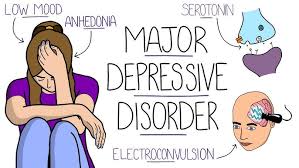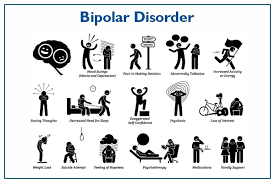The Impact of Depressive Disorder on Mental Health
Depressive disorder, commonly known as depression, is a serious mental health condition that affects millions of people worldwide. It goes beyond feeling sad or going through a rough patch; it is a persistent feeling of sadness and loss of interest in activities that were once enjoyable. Depression can have a profound impact on daily life, affecting how one thinks, feels, and handles daily activities.
Symptoms of Depressive Disorder
The symptoms of depressive disorder can vary from person to person but often include:
- Feelings of sadness, hopelessness, or emptiness
- Lack of interest in previously enjoyed activities
- Changes in appetite or weight
- Difficulty sleeping or oversleeping
- Fatigue or loss of energy
- Feelings of worthlessness or guilt
- Difficulty concentrating or making decisions
- Thoughts of death or suicide
Treatment and Support for Depressive Disorder
It is important for individuals experiencing depressive disorder to seek help from mental health professionals. Treatment options may include therapy, medication, lifestyle changes, and support groups. Therapy can help individuals explore their thoughts and feelings in a safe environment and develop coping strategies to manage their symptoms.
Medication may be prescribed by a psychiatrist to help regulate brain chemistry and alleviate symptoms. Lifestyle changes such as regular exercise, healthy eating habits, and proper sleep hygiene can also play a significant role in managing depressive disorder.
Breaking the Stigma Surrounding Mental Health
One of the biggest challenges for individuals with depressive disorder is the stigma associated with mental health conditions. It is important to raise awareness and promote understanding about depression to encourage those affected to seek help without fear of judgment.
By educating ourselves and others about depressive disorder and other mental health conditions, we can create a more supportive and compassionate society where seeking help for mental health issues is seen as a sign of strength rather than weakness.
Understanding Depressive Disorder: Answers to 7 Common Questions
- What is depressive disorder?
- What are the symptoms of depressive disorder?
- How is depressive disorder diagnosed?
- What are the treatment options for depressive disorder?
- Can lifestyle changes help manage depressive disorder?
- Is medication necessary for treating depressive disorder?
- How can I support a loved one with depressive disorder?
What is depressive disorder?
Depressive disorder, commonly referred to as depression, is a mental health condition characterized by persistent feelings of sadness, hopelessness, and a loss of interest in activities that were once enjoyable. It goes beyond temporary feelings of sadness and can significantly impact one’s daily life and overall well-being. Individuals with depressive disorder may experience changes in appetite, sleep disturbances, fatigue, and difficulty concentrating. Seeking help from mental health professionals is crucial for proper diagnosis and treatment of depressive disorder, which may involve therapy, medication, lifestyle changes, and support to manage symptoms effectively.
What are the symptoms of depressive disorder?
The symptoms of depressive disorder, commonly known as depression, can manifest in various ways and may differ from person to person. Some common symptoms include persistent feelings of sadness, hopelessness, or emptiness, a loss of interest in activities that were once enjoyable, changes in appetite or weight, disruptions in sleep patterns such as insomnia or oversleeping, fatigue or loss of energy, feelings of worthlessness or guilt, difficulty concentrating or making decisions, and thoughts of death or suicide. It is important to recognize these symptoms and seek help from mental health professionals for proper evaluation and treatment.
How is depressive disorder diagnosed?
Depressive disorder is typically diagnosed through a combination of clinical assessment, medical history evaluation, and psychological evaluations. Healthcare professionals, such as psychiatrists or psychologists, may use diagnostic criteria outlined in the Diagnostic and Statistical Manual of Mental Disorders (DSM-5) to determine if an individual meets the criteria for depressive disorder. They will often conduct interviews to assess symptoms, duration, and impact on daily functioning. Additionally, they may use tools such as questionnaires or rating scales to gather more information about the severity of depressive symptoms. It is important for individuals experiencing symptoms of depression to seek professional help for an accurate diagnosis and appropriate treatment plan.
What are the treatment options for depressive disorder?
When it comes to treating depressive disorder, there are several options available to individuals seeking help. Common treatment approaches include therapy, medication, lifestyle changes, and support groups. Therapy, such as cognitive behavioral therapy (CBT) or interpersonal therapy, can help individuals explore their thoughts and emotions in a supportive environment and develop coping strategies to manage their symptoms. Medications like antidepressants may be prescribed by a psychiatrist to help regulate brain chemistry and alleviate symptoms. Additionally, incorporating healthy lifestyle habits such as regular exercise, balanced nutrition, and adequate sleep can also play a crucial role in managing depressive disorder. Support groups provide a sense of community and understanding for individuals dealing with depression, offering a space for sharing experiences and receiving encouragement. It’s important for those experiencing depressive disorder to work with mental health professionals to determine the most effective treatment plan tailored to their needs.
Can lifestyle changes help manage depressive disorder?
Lifestyle changes can play a significant role in managing depressive disorder. Incorporating healthy habits such as regular exercise, balanced nutrition, adequate sleep, and stress management techniques can positively impact mood and overall well-being. Physical activity, in particular, has been shown to release endorphins, the body’s natural feel-good chemicals, which can help alleviate symptoms of depression. Additionally, establishing a routine that includes self-care practices and engaging in activities that bring joy and fulfillment can contribute to a more balanced mental state. While lifestyle changes alone may not be a complete solution for everyone with depressive disorder, they can complement other treatment methods and improve the overall quality of life for individuals struggling with this condition.
Is medication necessary for treating depressive disorder?
When it comes to treating depressive disorder, the necessity of medication varies from person to person. While medication can be an effective tool in managing symptoms of depression, it is not always a mandatory component of treatment. Some individuals may find relief through therapy, lifestyle changes, and support networks without the need for medication. However, for others, especially those with severe or persistent symptoms, medication prescribed by a psychiatrist may be crucial in achieving stability and improving quality of life. It is essential for individuals struggling with depressive disorder to work closely with mental health professionals to determine the most appropriate treatment plan tailored to their specific needs and circumstances.
How can I support a loved one with depressive disorder?
Supporting a loved one with depressive disorder can be challenging but crucial for their well-being. It’s important to offer empathy, patience, and understanding while encouraging them to seek professional help. Listen actively when they want to talk and avoid judgment or giving unsolicited advice. Encourage them to engage in activities they enjoy, practice self-care, and maintain a healthy routine. Be a consistent source of support and reassurance, reminding them that they are not alone in their struggle. Educate yourself about depressive disorder to better understand their experiences and offer meaningful support during difficult times.



